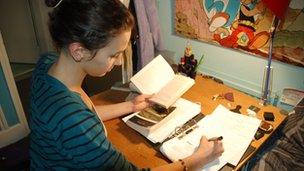Number of graduates in basic jobs doubles in five years
- Published

Overall the figures show that 71% of last year's graduates had jobs six months after university
The number of new UK graduates working in jobs like cleaning or bar work has almost doubled to 10,000 in five years, according to government statistics.
The figures, from the Higher Education Statistics Agency, also showed more than 20,000 were still out of work six months after leaving university.
Overall the data showed 71% in work and a further 16% in continued study.
Universities Minister David Willetts said graduates were still doing better than people without degrees.
The figures showed 9% of new graduates were jobless six months after completing their degree in 2010/11.
This was the same proportion as the year before but almost double that for 2006/7 when the figure stood at 5%.
A further 5% were working in jobs such as labourer, courier, office junior, hospital porter, waiter/waitress, bar worker, cleaner or road sweeper - up from 3% five years ago.
The figures also showed a continuing rise in the numbers employed in sales and customer-service roles, such as sales assistant, market trader or call-centre staff - 20,675 (10%) of new graduates worked in these areas last year, a rise of more than 1,000 on the year before and up from 12,740 five years ago.
The figures showed the largest group, more than 47,000 people (23%), went into "associate professional and technical jobs", as nurses, paramedics, interpreters or laboratory technicians.
Graduates diversifying
Just over 10,000 (5%) went into management and just under 37,000 (17%) entered professions like law and medicine.
A separate survey of 1,000 students for the high street chain, Aldi, suggested only a quarter of UK undergraduates expect to gain a job in their field of study.
A further 39% of students questioned by One Poll said they were prepared to start at the bottom of the career ladder, despite training for a particular vocation for three years or more.
Most (71%) said they intended to apply for a wide range of jobs and 58% said they were prepared to work for a yearly wage of less than £20,000.
The general secretary of the University and College Union, Sally Hunt, said: "Today's figures are further bad news for students.
"People working hard at university face an incredibly challenging jobs market when they graduate and the government should be doing more to stimulate jobs and growth."
Anne-Marie Martin, president of the Association of Graduate Careers Advisory Services, said students should be aware of changes in the jobs market which meant fewer opportunities for graduates in public services.
"These are challenging times for graduates, but there are jobs available.
"Be flexible. Have a plan B. There are fantastic opportunities with smaller companies but they don't have the huge marketing budgets of the big employers, and so you need to be creative about your job search."
Mr Willetts said: "Although the unemployment market is challenging, graduates continue to do better than non-graduates and their prospects tend to pick up more quickly during a recovery.
"We must ensure that graduates enter the labour market equipped to succeed.
"The Higher Education White Paper outlines proposals that will deliver a greater focus on graduate employability.
"Universities will need to publish high-quality comparable information on employment rates and future salaries of graduates by university and by course.
"We will also improve the regime for sandwich courses and promote a new framework for business and universities to work together to ensure a better fit between graduates and jobs."
- Published7 March 2012
- Published8 September 2011
- Published28 June 2011
- Published18 May 2011
- Published9 April 2011
- Published1 November 2010